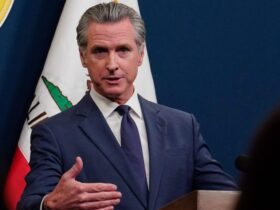The so-called Department of Government Efficiency was many things in the first months of the second Trump administration. It was a chain saw, a wood chipper, and “a way of life, like Buddhism,” according to Elon Musk, its fearless leader according to everyone but the president’s lawyers. It was a funnel of disinfo, a conflict of interest, a bureaucratic mystery, and a tired meme. But above all, it was the realization of a dream.
For all the talk of changing demographics and new coalitions, the most important development in US politics last fall involved money and power: The billionaires who believe their technology will save civilization found common cause with authoritarians who hoped that same technology could help them control it. They realized that, in the end, the things they wanted were mostly the same. The problem was democracy; the solution was technofascism.
The idea that a post-liberal, “merit-based” ruling class should use new technologies to govern the rest of us has been building on the right for years. Peter Thiel, the venture capitalist and former Musk business partner whose condemnation of vacuous startup culture nudged Vice President JD Vance toward Catholicism, once questioned whether “freedom and democracy are compatible.” (This skepticism of the democratic process did not stop him from spending tens of millions of dollars to influence it.) He was neither the first nor the last to suggest that our current political system had set a trap that only a few skilled visionaries could free us from.
Among the earlier proponents was Musk’s own apartheid-supporting grandfather, who believed in replacing the electoral system with a “technocracy” of benevolent scientists. One of the more prominent thinkers on the new right these days is Curtis Yarvin, whose pitch for a monarchical “Dark Enlightenment” reached an audience that included Vance, Thiel, and VC billionaire Marc Andreessen. Andreessen, who has mocked the use of the term “technofascist” to describe the administration, describes himself as a “techno-optimist,” who believes artificial intelligence breakthroughs will usher civilization onto a new plane of existence and the sooner we get there, the better. This faith in the destiny of accelerating technological progress has become Silicon Valley’s version of end-times theology and is affecting our politics in much the same way—anything that can be done, must, to hasten the coming of the Borg.
DOGE offered a glimpse of the technofascist future. It formed the beachhead for a targeted hit on public institutions and their employees in the service of a new, radical, and cash-soaked post-democratic order. The fact that a few were imposing this on the many was the point.
If this bureaucratic smash-and-grab had a technical mission, it was to break down existing silos of the data the government collects on you to enable a sort of God’s-eye view of the American populace.
Musk and his allies relished demolishing firewalls online and off, forcing their way into buildings and firing or threatening to arrest civil servants who refused to comply. Federal employees feared that DOGE was monitoring what they typed and using AI to eavesdrop on what they said. At one point during Musk’s successful attempt to “delete” the United States Agency for International Development, employees thought they had restored funding for a few lifesaving programs for children, only for two Musk lieutenants to simply uncheck those boxes in the agency’s computer system; “pronatalism” for me, DOGE for thee. A manifesto shared by Joe Lonsdale, who co-founded the surveillance behemoth Palantir with Thiel, implored the administration to “fire people who can’t be fired…Mass deport people who can’t be deported.” Musk, for his part, urged the administration to “go after” Tesla critics and suggested the administration could ignore court orders—which, of course, Donald Trump did.
If this bureaucratic smash-and-grab had a technical mission, it was to break down existing silos of the data the government collects on you to enable a sort of God’s-eye view of the American populace. Big Tech and the government have hoovered up and exploited your data for decades, but never so openly and so panoptically. Musk was trying to riffle through your Social Security, Medicare, and tax data. The goal was to use these pots of information—long legally separated to avoid exactly this kind of thing—to purge the undesired and justify the mass reduction of government the right has long pined for.
As usual, immigrants bore the brunt. The government used AI to trawl through the personal data of thousands of students to find thought crimes. Palantir used its vast data collection apparatus to help the government locate and track undocumented residents. To ensure those immigrants could never collect benefits, the Social Security Administration simply reclassified thousands of people as dead. At the Border Security Expo in Phoenix in April, acting ice Director Todd Lyons expressed his wish that the government could streamline the logistics of mass deportation. What was needed, he said, according to the Arizona Mirror, was “like Prime, but with human beings.”
The first few months of the administration were filled with moments like that. It was not just that the new people in charge sounded like the sort of people who hunt service workers for sport, but that they didn’t really seem to care who knew.
The key to the administration’s technofascist turn was that you could start from either direction and end up in the same place. Tech was a means to impose fascism; fascism was a means to unfettered tech. The rise of cryptocurrency and AI helped the MAGA movement and Silicon Valley moguls meet in the middle. Eager to have a president who would let them do as they pleased, some of the biggest names in the business showered Trump with hundreds of millions of dollars in campaign cash. To them, these kinds of civilization-shaking creations demanded an accommodation from everyone else. They would require massive new infusions of energy and render the existing economy obsolete. (With one notable exception: Andreessen predicted recently that venture capital investing could be “one of the last remaining fields that people are still doing” after AI takes over, because it is more an art than a science.)
And then there’s Trump 2.0’s preferred aesthetic, a sort of machine-learning mashup of Thomas Kinkade, Leni Riefenstahl, and Starship Troopers that renders the harshest fever dreams in soft-focused and cruel ways. In February, the president posted an AI-generated video of an ethnically cleansed Gaza, with Musk eating flatbread on a beach. The Department of Defense recently offered up its own vision of Secretary Pete Hegseth holding up an inexplicably four-fingered hand next to the border wall. Slop like this is everywhere now, in White House statements and in the depths of Musk’s Grok-powered feedback loop.
This grand alliance is a bit fraught, though, as the recent falling out between the president and his richest ally underscored. Trump wants to unshackle particular kinds of technology to help particular groups, but it’s not exactly “technocracy.” For one thing, he fired all the technocrats—and gutted the nation’s capacity for research. Andreessen’s “Techno-Optimist Manifesto” includes the immortal line: “We had a problem of pandemics, so we invented vaccines.” How’s that going?
Immigrants were just the initial target. Musk’s legion—which is also, according to the Wall Street Journal, how he describes his kids—launched a broader attack on the mostly liberal white-collar professionals he and his fellow oligarchs blamed for debasing society. They were “the professional managerial class” or “childless cat ladies”—denizens of what the court philosopher Balaji Srinivasan refers to as the “Paper Belt.” The professional class who staff not just the government, but higher education, media, law firms, and NGOs were the enemy, and the solve, in industry terms, was to blow up those sectors. “You probably deserved it,” Sen. Jim Banks (R-Ind.) told a recently axed Department of Health and Human Services employee who confronted him on Capitol Hill in April. Why? Because, Banks later explained, the man had a “woke job.”
All of the most malicious forces in government are now integrated with a Silicon Valley powered by an existential sense of urgency and illusions of its own supremacy. For all the flashy tech and futurist manifestos, this new politics is a throwback. Offering medals to women who have a certain number of children—an actual proposal that two of Musk’s fellow pronatalists sent to the White House —feels a bit midcentury German. Musk’s obsession with IQs and large brains is a sequel many times over, indicative of a growing sense that the people in power believe they are innately superior. To them, the world is divided between protagonists and NPCs—automated background video-game characters, in other words, not so unlike “the unthinking demos” Thiel once lamented controlled “so-called ‘social democracy.’” For a long time, as investors threw money at robotaxis and never-realized Hyperloops, the joke was that the San Francisco Bay Area’s best and brightest were hard at work trying to reinvent the bus. But it turns out if you get enough VCs in a Signal chat together, you’ll eventually reinvent feudalism, too.
















Leave a Reply